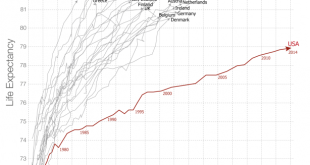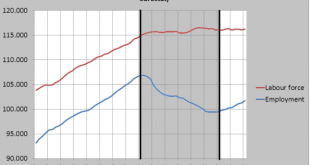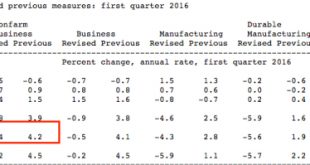from David Ruccio While I was finishing up the latest right-wing libertarian dystopian finance novel, I was also trying to figure out the dystopia that the U.S. healthcare system has become. Clearly, for most Americans, the combination of private healthcare and private health insurance (and, now with Obamacare, public subsidies) is a nightmare. There is a glaring contradiction between healthy profits and the health of the U.S. population. Over the course of the next couple of weeks,...
Read More »Open Ended [A note to myself]
from Peter Radford One of the major reasons, perhaps the major reason, economics is oftentimes irrelevant to our understanding of economies is that it fails to notice a rather salient fact: economies have no end. They have no beginning either. Or, rather, the choice of an ending or a beginning are merely arbitrary selections by an analyst needing to close up the system for analytical purposes. But this act of closure destroys the validity of any results from the subsequent analysis. Why?...
Read More »Employment and the labour force in the EU, 1992 (2000) – 2016. 4 graphs.
How are the EU and the Euro Area doing? some graphs about the labour force. Main points: Very fast employment and labour force growth in Germany during the last year (‘despite’ the new the minimum wage in many sectors). The labour force is increase is not just about refugees but to quite an extent about non-German inhabitants of the EU. Mind the employment decline after the Harz reform’ around 2001. I’m not sure if the fast increase also shows in the data of the Statistisches Bundesamt.A...
Read More »Food and Justice – The next WEA Conference
from Maria Alejandra Madi The Call for papers for the current conference Food and Justice is now open. We invite you to submit a paper to [email protected] by 15th September, 2016. A paperback, Food and Justice, of conference papers will be published by WEA Books in the new year. Visit the Conference website http://foodandjustice2016.weaconferences.net/ Food production has always been present in the economic debate because of the concern about population growth and demographic...
Read More »Father daughter cooking!
Melissa and I made some pizza's for daddy date night
Read More »Not so fast!
from David Ruccio Everyone has read or heard the story: the labor market has rebounded and workers, finally, are “getting a little bigger piece of the pie” (according to President Obama, back in June). And that’s the way it looked—until the Bureau of Labor Statistics revised its data. What was originally reported as a 4.2 percent increase in the first quarter of 2016 now seems to be a 0.4 decline (a difference of 4.6 percentage points, in the wrong direction). What’s more, real hourly...
Read More »Trade, Truth and Trump
from Dean Baker Donald Trump seems to have driven a substantial portion of the media into a frenzy with his anti-trade rhetoric. While much of what Trump says is wrong, and his solutions are at best ill-defined, the response in the press has largely been dishonest. For example, a New York Times editorial tried to imply that there was an ambiguous relationship between the size of the trade deficit and employment in manufacturing. It pointed out that Japan and Germany, both countries with...
Read More »Education, inequality, and power
from David Ruccio Is education the solution to the problem of growing inequality? As I wrote in early 2015, Americans like to think that education is the solution to all economic and social problems. Including, of course, growing inequality. Why? Because focusing on education—encouraging people to get more higher education—involves no particular tradeoffs. More education for some doesn’t mean less education for others (at least in principle). And providing more education doesn’t involve...
Read More »Financialization of corporate behaviour
from Maria Alejandra Madi The global scenario has restated the menace of deep depressions among the economic challenges. Indeed, in the current setting, the principles of corporate behaviour have reinforced the lack of commitment to long-run social and economic sustainability. Looking backward, in the context of the 1930 Great Depression, John Maynard Keynes pointed out that the evolution of capital markets increases the risk of speculation and instability since these markets are mostly...
Read More »The Paradox of People
from Peter Radford Last week I stirred up a certain curiosity as to why I had lumped Peter Drucker into the same bag as both von Mises and Hayek. Well, simply put, the three of them, along with Karl Popper and Joesph Schumpeter, had an enormous, even oversized, impact on modern economics. Yes economics. Let’s not fall into the same trap as economists do when they, with a sweep of their hands, dismiss business theory as not an aspect of economics. Of course it is. After all if business is...
Read More » Real-World Economics Review
Real-World Economics Review




